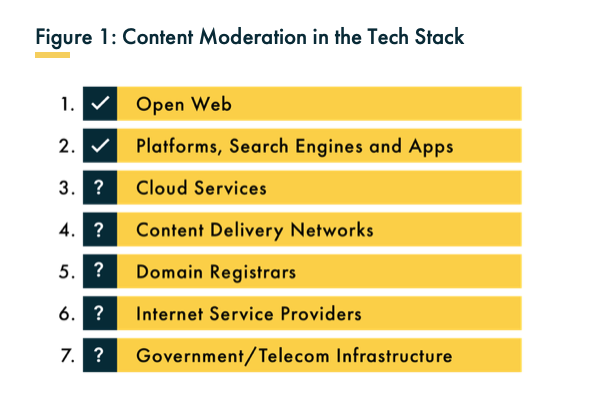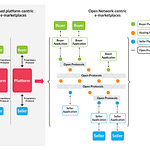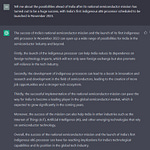Siliconpolitik: Mile Sur Mera Tumhaara
— Pranay Kotasthane
High Technology cooperation is fast becoming a differentiating point of the Quad arrangement. It appears that the Quad Working Group, which was formed after the first Summit meeting in March 2021, has locked in space, biotechnology, 5G communications, cybersecurity, and semiconductors as five immediate focus areas. Music to my ears.
As Technopolitik readers are aware, I have been making a case for a Quad collaboration on semiconductors over the last five months. So it was gratifying to find out that, amongst other things, the Quad launched a Semiconductor Supply Chain Initiative to "map capacity, identify vulnerabilities, and bolster supply-chain security for semiconductors and their vital components."
I have a long article in News18 analysing the significance of this announcement. Here are a few excerpts.
Q: What's the big deal about this announcement?
A: Two ways to look at it.
One, the Quad agrees that semiconductors are ‘metacritical’ — in the sense that success in other critical and emerging technologies depends on a secure, resilient, and fast-advancing semiconductor supply chain.
Two:
The summit fact sheet adds that the Quad partners should collectively support a diverse and competitive market for producing semiconductors. The last sentence is significant—it signals a shift in mindset from national indigenisation to strategic cooperation.
Subsidies, incentives, and tax breaks were the only instruments countries pursued — separately — until now. Semiconductors entering the Quad agenda is a recognition of the fact that no one nation-state can eliminate all bottlenecks in the complex semiconductor supply chain.
To illustrate this point, see the Taiwan Economy Minister’s statement earlier in the week:
“Taiwan alone could not sort out the problem because the supply chain is so complex. The bottleneck in fact is in Southeast Asia, especially Malaysia, because for a while the factories were all shut down.”
When the country that accounts for nearly 70 per cent of contract chip manufacturing says that it alone cannot de-bottleneck the supply chain, other countries should take note. As I keep saying: strategic cooperation is a necessity, not a choice.
Q: What next. Is this initiative enough?
A:
“Mapping the supply chain vulnerability should only be a first step of the collaboration. The grouping can directly bolster supply chain security in the following ways.
One, Quad can form a consortium aimed at building a diversified semiconductor manufacturing base. The consortium could create a roadmap for new manufacturing facilities across Quad countries. The focus should be to collectively have access to manufacturing at the leading-edge nodes (5 nanometres and below) and critical trailing-edge nodes (45 nanometres and above). The latter will continue to remain workhorses for automotive, communications (5G), and AI.
Two, Quad can sponsor new standard developments such as composite semiconductors and create one centre for excellence (CoE) in each Quad country in an area of its immediate interest. For example, Australia could host the CoE for new materials in electronics, Japan could host the CoE for silicon manufacturing equipment, and the US and India could host CoEs on specific fabless design architectures.
Three, Quad can facilitate strategic alliances between companies in each other’s countries. For example, faster visa processing and lower employment barriers for semiconductor professionals in Quad member countries could facilitate higher technology exchange and joint development levels. Removing technology transfer restrictions could make overseas licensing easier. Easing capital flows in this sector could again foster more joint development projects.”
Q: What's in it for India?
A:
“India should use the Quad collaboration to get a Japanese or American company to manufacture semiconductors in India, even if it’s at a trailing-edge node such as 65 nm. Collaborating with partners would minimise the risk of failures while ensuring India’s core defence and strategic interests are secured.
Moreover, the AUKUS defence alliance has shown that the US is willing to share sensitive technologies with key partners, something it wasn’t amenable to in the past. This new technology alliance mindset should become the norm in Quad as well. India should push for the US to lower investment barriers and reduce export controls.
Apart from IC manufacturing, India should double down on its core strength. In a Takshashila Institution report titled India’s Semiconductor Ecosystem: A SWOT Analysis, we observed that India has an outright advantage in semiconductor design. The next step should be to encourage indigenous intellectual property creation. PM Modi’s meeting with the Qualcomm CEO is vital in this regard. With more multinational companies moving their cutting-edge semiconductor design to Indian offices, the Indian ecosystem will develop organically.”
Well begun is half-done. In the next edition, I’ll have some recommendations for what the Quad can consider to deepen this cooperation on semiconductors.
Cyberpolitik #1: Rus(sia)hing to decisions
— Prateek Waghre
In the last few weeks, there have been two sets of significant developments involving Russia and the Internet:
After several weeks of sustained pressure from Russian authorities, in mid-September, Google and Apple removed a 'smart voting' app from Alexei Navalny's team just before the elections (Techmeme aggregation of related links)
As part of its efforts to deal with COVID-19-related misinformation, YouTube took action against two German-language channels operated by Russia Today. Russia threatened to retaliate by blocking YouTube and German media outlets.
These issues represent a microcosm of the myriad issues at the intersection of technology and geopolitics.
In this section, let's look at three of them:
Content Moderation through the stack
Not only did Apple and Google remove the app from the Russian versions of their respective app stores, but they also took actions that had downstream effects. Apple, reportedly, asked Telegram to remove some channels that Navalny's team were using to share information or risk being removed from the App Store. Telegram complied.
These actions are neither new nor exceptional - but what is notable is that they have been praised (de-platforming Alex Jones' Infowars, Parler) or criticised (VPN apps in China, HKMAP.live during the 2019 HK protests) in the past, depending on the context. WSJ’s Facebook Files series also references Apple’s role in Facebook’s response to concerns about human trafficking. This is, of course, not specific to Apple, as a range of companies and services at different levels of the internet stack like AWS, Cloudflare, GoDaddy, etc., have had to make such decisions.
A particularly notable recent example was the case of OnlyFans, where the company announced (and later rolled back) policies that would have banned creators who posted adult content. The move was a result, not of any regulatory pressure or social backlash, but the apparent squeamishness of some firms in the financial services industry in the UK, which would have had an impact on creators around the world.
I've also written about the subject of content moderation through the stack over on MisDisMal-Information (27 - Content Moderation Stack, 36 - Must-Carry Water and Internet Scores and 48 - moderation: stacked and loaded)
Complying with 'local regulation'
In the lead-up to Apple and Google removing the 'smart 'voting' app, they were threatened with fines, made to appear before committees where reports suggest that authorities named specific employees that would be liable for prosecution. A proposed Russian law requires that internet companies with over 500 thousand users in Russia set up a local presence. Similar regulation around the world has earned them the moniker of 'hostage-taking laws' as they open employees up to the risk of retaliation/harassment by state authorities.
The local regulation that led to Apple warning Telegram is believed to be about 'election silence' - which prohibits campaigning during elections. Such laws are not unique to Russia.
Multinational companies operating across jurisdictions have had to 'comply with local regulation.' It was rarely an option until the information age, making it possible to scale across countries without establishing a physical presence. Even in the internet economy, companies that operate physical infrastructure deep into the tech stack often have limited choice. I have some personal experience with this, being part of a team that managed Content Delivery Network operations for China and Russia between 2015 and 2018.
Rapid and Global Scale Decision-making
When YouTube decided to enforce its COVID-related misinformation policies, did it anticipate that channels operated by Russia Today would be swept up by the enforcement action and did it expect threats/retaliation by Russian authorities? In 2021, there is no excuse not to, considering we have witnessed so many instances where technology companies found themselves in situations with geopolitical implications. Yet, we must stop and ask two questions. First, do they have the capacity to make these decisions on a global scale on a near-realtime basis? Second, do we want them to make such choices? Arguably, the order should be reversed, but we have to ask the capacity question in parallel since we're already in a situation where they make such decisions.
As US and allied forces were withdrawing from Afghanistan, sections of the press were heavily critical of social media platforms for continuing to platform Taliban-associated voices. Though, we also do need to take into account that nation-states with significant resources and capacity dedicated to international relations and geopolitics have, even now, yet to make a decision (this, of course, is likely strategic in many cases). But it does leave several open questions for private companies that often rely on nation-states for directionality. In this context, it is worth listening to this Lawfare podcast episode which draws parallels with the financial services industry and the mechanisms they can rely on to make decisions regarding dealing with banned groups.


Takshashila is doing a Global Outlook Survey covering domains like India’s bilateral and multilateral engagements, national security concerns, economic diplomacy and attitudes towards the use of force. If this sounds interesting, do click-through to participate.
CyberPolitik #2: Thinking (Data) of the Leaks
— Sapni G K
Voluminous reports surrounding data leaks have surfaced in the past two weeks. Facebook prioritising profits over the safety of its platforms has kept users and the US Congress on their toes. Another series of leaked reports dubbed the Pandora Papers allege tax evasion by famous and powerful figures across the globe. The underlying thread running through these investigations is the nature of these exposes – data leaks. These are whistleblower and media-led efforts that broke into the secret vaults of data held dear by few powerful people. The journalistic value of these investigations cannot be undermined. However, the question of data governance mechanisms crops up again.
Data regulation is not settled for good, regardless of the EU GDPR. Although it provides certain consent-focused templates for transparency in the use of data across sectors, there is no apposite global standard for data governance yet. In the absence of any clearly laid down and achievable normative standard, regulation of technology itself will emerge as a challenge in multiple forms. This manifests as multiple problems in platform regulation – where data maximisation leads to the prioritisation of engagement on the platform and consequentially pushing users into rabbit holes of harmful content, faulty algorithmic recommendations, and ultimately platforms that wield more power than many States.
These challenges are now increasingly being acknowledged by States. China’s efforts at regulating its tech titans reflect its intent to ensure that corporations keep towing its line. The recently concluded EU-USA Trade and Technology Council meeting also reiterated the necessity to lay down standards for data governance. This is critical as we develop technology that captures larger troves of data, such as Artificial Intelligence. The joint statement issued by the Council emphasises the need for cooperation in standard-setting, focusing on human rights and democratic values.
Reports that India’s Personal Data Protection Bill will expand its mandate to become an exhaustive data protection legislation are worth consideration here. India’s data governance framework is limited to a few sectoral regulations by the RBI and the SPDI Rules under the IT Act, 2000. While an overhaul of the current regulatory regime is necessary, thinking through nuances with speed and precision is important. India’s pace in this regard may not give us an opportunity for global standard-setting. A well-defined data governance regime is critical as we start large-scale implementation of technology-based solutions that deal with sensitive information such as health data.
Antariksh Matters: The Quad looks to the heavens, with an eye on China
— Aditya Ramanathan
The Quad has taken baby steps towards space cooperation. A fact sheet jointly released by India and the US announced that the Quad had set up a working group on space. The bilateral joint statement also outlined three areas of cooperation: sharing satellite capabilities on “climate-change risks and the sustainable use of oceans and marine resources,” building capacity for space-related activity among other Indo-Pacific states, and consulting on norms and guidelines.
Sharing data and analysis on climate change makes sense because it is a major threat to states in the Indo-Pacific and is a way of providing public goods to smaller states in the region. The second area of cooperation - capacity building - can also turn the Quad into a major provider of public goods to smaller states in the region, helping them operate their own military, commercial, and scientific satellites, thereby reducing their dependence on China’s space programme. If the Quad actually achieves these goals, its member states might also be able to operate more ground stations from the territory of these states, improving their own space situational awareness (SSA).
The third area of cooperation mentioned - consulting on norms and guidelines - may sound the most innocuous or non-descript, but it is, in fact, rooted in the strategic considerations that prompted the creation of the Quad in the first place. China’s 2007 kinetic ASAT missile test certainly prompted India’s own test in 2019. The creation of the PLA Strategic Support Force and mounting evidence of China’s counterspace programme have finally prompted Quad states to coordinate their efforts.
Norms and guidelines are inherent to the challenge of managing strategic competition in space because they can help shape its pace and direction. This is the primary reason that the US is opposed to Sino-Russian proposals for a treaty governing the weaponisation of space. India’s own approach to these proposals has been cautious, but the realities of China’s non-kinetic counterspace capabilities will continue to nudge it into joining the other Quad states in proposing new norms of behaviour in outer space.
While the joint statement made a brief mention of space situational awareness (SSA), this is likely to become an important part of Quad cooperation. Here, the geographic dispersion of the four Quad states is actually an asset, as it allows Quad states to leverage ground stations across continents and in both hemispheres.
Finally, we should note something crucial that the joint statement did not cover: the private sector. While stories of interplanetary probes or human spaceflight may dominate the headlines, what matters most are satellites that look back at the Earth, and Earth-based sensors that track satellites in the planet’s celestial littoral. This is the beating heart of commercial space enterprise, and it presents a major opportunity for the Quad to create and expand “bubbles of trust” that allow for the sharing of key space technologies. The Quad working group on space can also function as a mechanism to identify policies that will encourage greater commercial interaction between private space companies in the member states. India could benefit immensely from this, whether by offering satellite construction or launch services, or offering downstream services for image processing and analysis.
Our Reading Menu
[Paper] CSET’s From Cold War Sanctions to Weaponized Interdependence is essential reading for anyone trying to understand the history of technopolitik
[Article] Navigating the tech stack - Joan Donovan
[Policy Review] Expanding the debate content moderation - Tarletop Gilespie et al
[Article] How hate speech reveals the invisible politics of internet infrastructure - Suzanne van Geuns and Corinne Cath-Speth.
[Paper] The Flaws of Policies Requiring Human Oversight of Government Algorithms by Ben Green
[Article] The Largest Autocracy on Earth by Adrienne LaFrance











Share this post